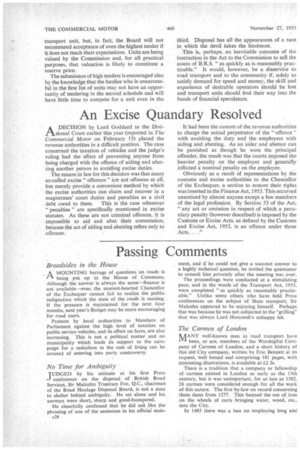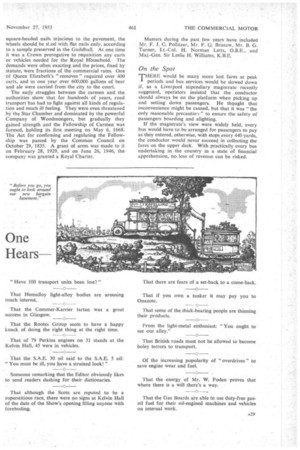Passing Comments
Page 30

Page 31

If you've noticed an error in this article please click here to report it so we can fix it.
Broadsides in the House
A MOUNTING barrage of questions on roads is r-k being put up in the House of Commons. Although the answer is always the same—finance is not available--even the stoniest-hearted Chancellor of the Exchequer cannot fail to realize the public indignation which the state of the roads is causing. If the pressure is maintained for the next four months, next year's Budget may be more encouraging for road users.
Protests by local authorities to Members of Parliament against the high level of taxation on public service vehicles, and its effect on fares, are also increasing.. This is not a political matter and no municipality which lends its support to the campaign for a reduction in the cost of living can be accused of entering into party controversy.
No Time for Ambiguity •
JUDGED by his attitude at his first Press J conference on the disposal of. British Road Services, Sir Malcolm Trustram Eve, Q.C., Chairman of the Road Haulage Disposal Board, is not a man to shelter behind ambiguity. He sat alone and his answers were short, sharp and good-humoured.
He cheerfully confessed that he did not like the phrasing of one of the sentences in his official state meat, and if he could not give a succinct answer to a highly technical question, he invited the questioner to consult him privately after the meeting was over.
The proceedings were conducted at a stimulating pace, and in the words of the Transport Act, 1953, were completed "as quickly as reasonably practicable." Unlike some others who have held Press conferences on the subject of State transport, Sir Malcolm appeared to be enjoying himself. Perhaps that was because he was not subjected to the "grilling" that was always Lord Hurcomb's unhappy lot.
The Carmen of London
NAANY well-known men in road transport have '1V1 been, or are, members of the Worshipful Company of Carmen of London, and a short history of this old City company, written by Eric Bennett at its request, well bound and comprising 181 pages, with interesting illustrations, is available at £2 2s.
There is a tradition that a company or fellowship of carmen existed in London as early as the 13th century, but it was unimportant, for as late as 1502, 26 carmen were considered enough for all the work of this nature. The first by-law on record concerning them dates from 1277. This banned the use of iron on the wheels of carts bringing water, wood, etc.: into the City.
In 1485 there was a ban on employing long and square-headed nails injurious to the pavement, the wheels should be sl.od with flat nails only, according to a sample preserved in the Guildhall. At one time it was a Crown prerogative to requisition any carts or vehicles needed for the Royal Hbusehold. The demands were often exacting and the prices, fixed by statute, were fractions of the commercial rates. One of Queen Elizabeth's " removes " required over 400 carts, and in one year over 600,000 gallons of beer and ale were carried from the city to the court.
The early struggles between the carmen and the authorities show that for hundreds of years, road transport has had to fight against all kinds of regulation and much ill feeling. They were even threatened by the Star Chamber and dominated by the powerful Company of Woodmongers, but gradually they gained strength and the Fellowship of Carmen was formed, holding its first meeting on May 6, 1668. The Act for confirming and regulating the Fellowship was passed by the Common Council on October 29, 1835. A grant of arms was made to it on February 28, 1929, and on June 26, 1946, the company was granted a Royal Charter. Masters during the past few years have included Mr. F. J. G. Pollitzer, Mr. F. G. Bristow, Mr. B. G. Turner, Lt.-Col. H. Norman Letts, 0.B.E., and Maj.-Gen. Sir Leslie H. Williams, K.B.E.
On the Spot
THERE would be many more lost fares at peak I periods and bus services would be slowed down if, as a Liverpool stipendiary magistrate recently suggested, operators insisted that the conductor should always be on the platform when picking up and setting down passengers. He thqught that inconvenience might be caused, but that it was " the only reasonable precautiol " to ensure the safety of passengers boarding and alighting.
If the magistrate's view were widely held, every bus would have to be arranged for passengers to pay as they entered, otherwise, with stops every 440 yards, the conductor would never succeed in collecting the fares on the upper deck. With practically every bus undertaking in the country in a state of financial apprehension, no loss of revenue can be risked.




























































































